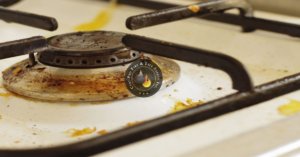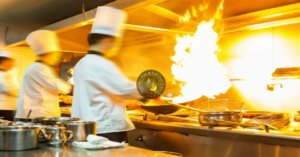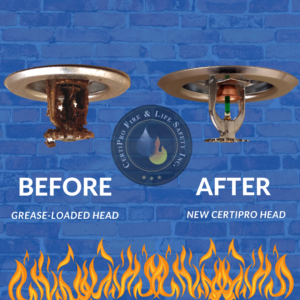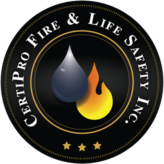It is common knowledge that fried food tastes better when it is crispy- fresh out of the fryer. For this reason, homeowners and businesses may dedicate part of their kitchen space specifically for frying food. Unfortunately, fried food will not only clog your arteries over time, but it can clog your fire system, putting you and your property in danger if not attended to properly. According to CertiPro Fire Protection Experts in Arizona, grease vapor can burn your kitchen down, and not in the way you’d expect!
How Can Grease be so Deadly?

When grease is ignited by flames, it can burn down your entire building. This sounds dramatic, but sadly it is true. CertiPro has assessed many commercial and residential fire systems in Arizona, and one of the major reasons a property fails to put out a fire is due to leftover grease.
As a restaurant, or even homeowner, you are aware that cooking can be risky, but before we explain why a seemingly innocent grease can be dangerous, let us start by examining how grease forms in the first place, especially on your sprinkler head!
Cooking oil works as a heat transfer medium to make food taste better. Once cooking oil combines with heat- such as fatty food such as meat, butter, or fish- it turns into a leftover white substance which is what we call grease.
Most people notice grease that is found on kitchen equipment and counters due to oil splashes. As it turns out, grease from oil actually travels through the air in the form of smoke or vapors. Unlike water-based vapor, grease that travels through vapor or smoke keeps its solid form and sticks to whichever surface it lands on. If you’re lucky, that grease will only stick to the ceiling or kitchen exhaust. However, if that grease sticks to your fire sprinkler heads, it brings a whole new set of problems with it.
When a flame ignites near a fire sprinkler, the air in the room surrounding the burning source heats up rapidly. A glycerin-based liquid- found in most sprinkler heads- reacts to the heat and expands to a point it where it breaks the sprinklers’ protection. The water will then spray and extinguish the blaze.
A building’s sprinkle head is key to an effective fire response time index (RTI). Grease particulates that travels through the air will accumulate on near by sprinkler heads. The accumulated grease will attract other natural elements like dust and dirt to stick onto surface. Unlike a clean fire sprinkler head, a grease-loaded head is unable to detect heat presence effectively. This puts the residents and building guests in a higher threshold of risk, and could result in death.
There are other factors that influence a sprinkler head’s fire fighting effectiveness, and if your fire protection system is experiencing any of these factors, a loaded sprinkler head will make it extremely difficult to point out. This is because grease restricts its component visibility. If there is corrosion, leaking, or loss of the glycerin bulb element, it would be too late to notice unless a blaze ignites and the system does not put out the fire.
Fire Safety in the Kitchen

Things can get out of control very quickly in the kitchen, and flames can be started over a small unnoticeable factor. This is why it is best to be prepared for any fire incident in the first place. Panning and designing a fire protection system for your kitchen is an ideal way to make sure any signs of out of control ignition are controlled before it gets worse. Below we outline a few factors to consider in designing the system.
A kitchen, whether it is a commercial or residential kitchen, holds the perfect conditions for a fire to get out of hand. You may be under the impressions that your kitchen sprinkler heads are safe because you hardly fry food or cook on a daily basis. But what is important to note about grease-loaded sprinkler heads is that it is not the only hazard present in your kitchen. There are at least 4 other hazards that are not caused by grease:
- Uncleaned Grease Traps
Since water is unable to wash away grease, a lot of people use grease traps to keep the area clean. Regrettably, most people forget grease traps exist and leave them uncleaned for days, even months. Piled-up grease can ignite a flame when a single tiny food scrap drops on them. - Clutter
Technically speaking, clutter hardly starts a fire unless someone is playing with a flame. However, it does not mean unorganized clutter is not a fire hazard. Once a fire starts, you will need a way to go outside quickly and efficiently. Clutter, especially flammable clutter, can either get in the way of your escape route or spread fire and make the situation even worse. - Electrical Wiring
An electric stove seems safer than a traditional stove. The fact is, both are hazardous if not maintained. Any electrical wiring is a perfect fire starter if it is frayed. - Stove
In a commercial kitchen, cooks are often required to have multiple orders cooking at the same time, so having multiple open flames going is not a strange occurence. Having more open flames increases your risk of fire hazard and is more difficult to manage. One tiny mistake and your kitchen is up in smoke!
How Safe Is My Fire Protection System?
 The design of a fire protection system is usually done before a residential or commercial kitchen opens. All commercial kitchen have some sort a fire protection system, and some cities like Scottsdale, AZ require their residential homes have a fire protection system installed. The question is, how safe is your building’s existing fire protection system?
The design of a fire protection system is usually done before a residential or commercial kitchen opens. All commercial kitchen have some sort a fire protection system, and some cities like Scottsdale, AZ require their residential homes have a fire protection system installed. The question is, how safe is your building’s existing fire protection system?
Most homeowners and business owners are not aware of the fire safety of their property. At most, building owners usually ask if their building has a system and take a brief look at how it works. What they don’t know is that fire protection quality depreciates over time and continuously needs to be maintained and inspected.
A basic step for better fire inspection is knowing whether or not your building complies with local jurisdictional law. If you are a property manager in the central Arizona region, reading up on our article about fire sprinkler code requirement and inspect your system accordingly. If you are a homeowner, you must familiarize yourself with the existing fire system and get it inspected regularly by professionals like CertiPro Fire and Life Safety.
Inspecting a fire system is no an easy task. It demands specific skills and knowledge to spot areas for improvement or issues that need to be fixed in your system. If your system is not inspected correctly, you may miss something that can cause a life to end in the near future.
